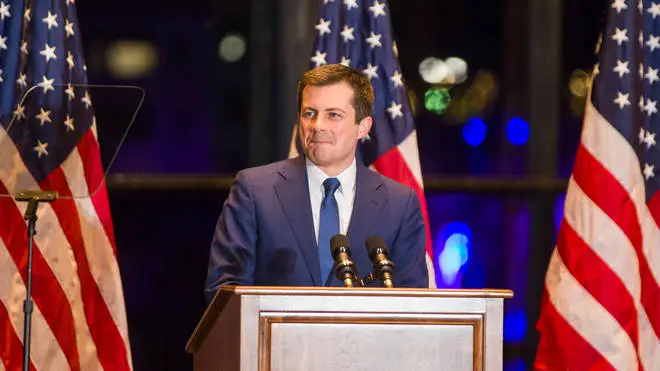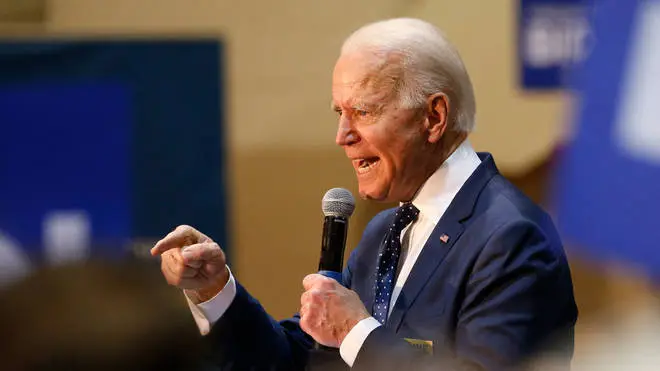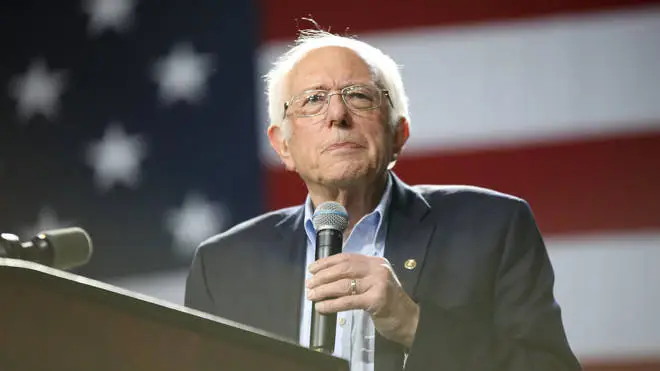
Simon Marks 3pm - 7pm
2 March 2020, 08:14
Pete Buttigieg, who was in the running to become the Democratic US presidential nominee, has dropped out of the race.
The former mayor of South Bend, Indiana, was the first openly gay candidate to seriously contend for the presidency - and among the youngest ever – but ended his campaign on Sunday.
The move came just a day after leading rival Joe Biden scored a resounding victory in South Carolina.
That sparked new pressure on the party's moderate wing to coalesce behind the former vice president.
Mr Buttigieg’s move came ahead of Super Tuesday, one of the campaign’s key days.

He told supporters in South Bend: "The truth is the path has narrowed to a close for our candidacy if not for our cause.
"We must recognise that at this point in the race, the best way to keep faith with those goals and ideals is to step aside and help bring our party and country together."
He did not endorse any of his former rivals, though he and Mr Biden exchanged voicemails on Sunday.
Mr Buttigieg has spent the past few weeks warning that nominating progressive leader Bernie Sanders to take on President Donald Trump would be risky.
The 38-year-old called on supporters to ensure that a Democrat wins the White House in November and that the party's success carries over to races for the House of Representatives and Senate.

During previous debates, Mr Buttigieg said Mr Sanders could threaten Democratic seats in Congress.
More broadly, Mr Buttigieg urged Americans to move beyond the divisive politics of the Trump era to embrace a more inclusive, unifying approach.
"Politics at its worst is ugly," he said.
"But at its best, politics can lift us up. It is not just policymaking. It is moral. It is soulcraft. That's why we're in this."
Voters saw Mr Buttigieg in the more moderate lane of the Democratic field, and he flourished early with a top finish in the Iowa caucuses and a close second place finish in New Hampshire.

But as the race moved to more diverse states, less dependent on college-educated voters, Mr Buttigieg struggled.
After his unexpected rise to contention in Iowa and New Hampshire last autumn, Mr Buttigieg became the target of Massachusetts Senator Elizabeth Warren for the high-dollar fundraisers he was hosting, notably one in a wine cave in California.
Minnesota Senator Amy Klobuchar also went at Mr Buttigieg in the months before the caucuses for lacking national experience.
She noted that he had lost his only statewide race as a candidate for Indiana treasurer in 2010, while she had won three statewide terms in Minnesota in part by carrying Republican-heavy regions.
He had modelled his campaign somewhat on that of former president Barack Obama, who won the 2008 Iowa caucuses largely based on a message of unity and by drawing in a healthy bloc of first-time caucus participants, often the key in a crowded, high-turnout contest.
Democratic strategist David Axelrod said "the Pete Buttigieg story isn't over,” adding: "He's 38 years old. He's vaulted himself into the national conversation.
"He obviously has work to do on some things - some weaknesses we've seen in this election - but whenever there is a conversation again about Democratic candidates, he'll be in that conversation.
"And that's a remarkable achievement, given where he started a year ago."